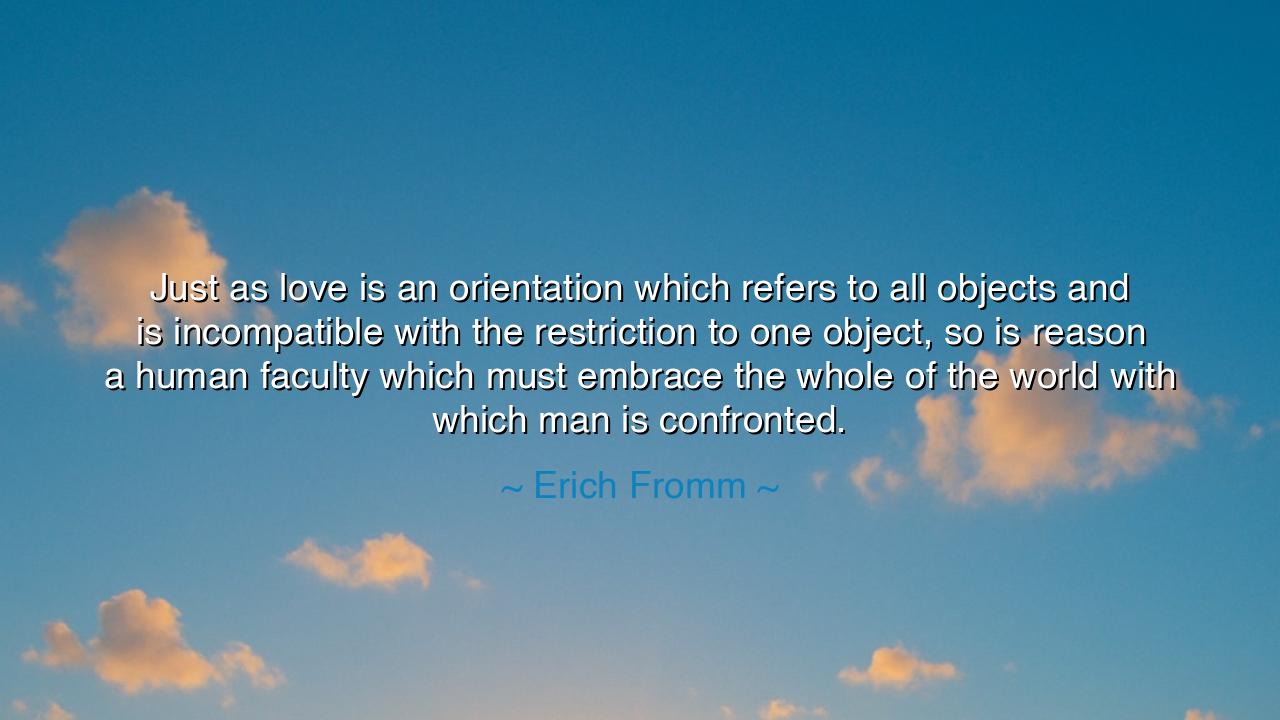
Just as love is an orientation which refers to all objects and is
Just as love is an orientation which refers to all objects and is incompatible with the restriction to one object, so is reason a human faculty which must embrace the whole of the world with which man is confronted.






"Just as love is an orientation which refers to all objects and is incompatible with the restriction to one object, so is reason a human faculty which must embrace the whole of the world with which man is confronted." — thus spoke Erich Fromm, the sage of human nature. These words echo not as mere philosophy but as a call to awaken the soul from the slumber of narrowness. In them lies the ancient truth that both love and reason are not possessions to be held, but forces to be lived. The heart that loves only one person selfishly has not yet known love; it has merely tasted attachment. Likewise, the mind that reasons only for its own gain, for its tribe or for its nation, has not yet known reason; it has only learned cunning.
The ancients knew this well. When Socrates stood in the marketplace of Athens, he did not reserve his dialogue for the rich or the wise alone. He spoke to slaves, to merchants, to the young and the aged. His reason embraced the whole of mankind, because he saw the spark of truth within each soul. He believed that wisdom could not flourish in isolation, just as a tree cannot bear fruit without sunlight and rain from every side. His death — calmly taken, without hatred — stands as a testimony that true reason is universal, bound to no one master and no single creed.
So too is love. To love is not merely to desire another’s presence, but to feel reverence for the living world. The one who loves rightly does not confine affection to one beloved while scorning others; their love flows like a river, nourishing all it touches. Think of Mother Teresa, who saw the divine not in marble statues, but in the eyes of the dying. Her love did not discriminate; it was orientation, not obsession. The beggar and the child, the leper and the saint — all were embraced as part of the same infinite whole.
Yet how easily man forgets this! In his hunger for security, he turns love into possession and reason into justification. He claims that he loves, but only those who reflect his image. He claims that he reasons, but only to defend his beliefs. Such blindness breeds division, war, and loneliness. The heart that narrows itself to one, and the mind that limits itself to one truth, both wither like flowers denied the sun.
Therefore, the teaching of Fromm is a summons to liberation. He reminds us that both love and reason are orientations of being, not temporary acts. To love one being truly is to love the universe through that being. To reason about one thing honestly is to open the mind to all truth. When man allows his heart and his intellect to expand beyond fear and prejudice, he partakes in the divine unity of life — the same unity the mystics spoke of when they said, “All is one, and one is all.”
Let us learn from the story of Galileo Galilei, who, though condemned by men of narrow reason, still raised his eyes to the heavens in wonder. His reason was not rebellion for pride’s sake; it was the human faculty embracing the world, seeking harmony with the cosmos. Even under threat, he whispered, “E pur si muove” — “And yet it moves.” That whisper was not defiance but faith in the wholeness of truth — a love of reality itself, larger than fear or dogma.
The lesson, then, is clear: To live as a whole being, one must both love and reason without boundary. Love that excludes is not love; reason that discriminates is not reason. In our time of division, these words must be remembered. Love universally. Think universally. Let every conversation, every judgment, every act be guided by the awareness that all things are interconnected.
And as you walk through the world, practice this: each day, find one person whom you would normally overlook — and listen to them with your full heart and clear mind. Let your love see them as kin, and your reason seek to understand them. In doing so, you honor the sacred truth that Fromm entrusted to us: that both heart and mind, when freed from limitation, become instruments of human unity — and through them, we touch the eternal.






AAdministratorAdministrator
Welcome, honored guests. Please leave a comment, we will respond soon